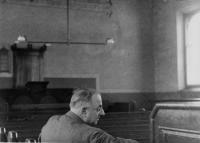'He sat where he had done thirty years before; then read the News Chronicle - he'd already read six other papers that day. .. Back at the hotel we changed for tennis and I played Frank. His energy is amazing; he serves well and has a good eye. He ran too.'
Strong was impressed by the vigour with which Buchman played, but as he had previously taken part in Junior Wimbledon, 'gave Frank pat-ball' at the beginning to try to make the game more even. Buchman strode to the net: 'You're not going full-out, Arthur! That's not fellowship!'
Strong had first worked with Buchman the previous year, taking time off from his flourishing business to help with a picture magazine Buchman was planning. At the Oxford house-party that year he had felt the need to make some spiritual sacrifice, and said in a meeting that he thought he should sell his cameras. After the meeting Buchman sent for him.
'I hear you feel you should sell your cameras,' he said. 'How much are they worth?'

'About £150,' replied Strong.
'Hand me my coat,' said Buchman, who then took out his wallet and handed over £150, almost all the money he had. Then he said, 'Now, Arthur, you can look after my cameras until I need them.' So Strong took the cameras and money, and used both for a photographing trip he had long wanted to make. A year later, he gave up his business and came to work full-time with Buchman.
At Whitsun 1935 Buchman's secretary, Joyce Machin, died suddenly of a tumour of the brain. Michael Barrett and another young Scot, Lawson Wood, volunteered to take on her duties. Barrett was the son of an Edinburgh printer and had been in the Oxford ju-jitsu team. Wood had read law at Aberdeen. Both were around 25, and each had an ample supply of Scots determination and pride. They learnt typing and speed-writing and set to work.
Barrett, who married one of Lloyd George's grand-daughters, remarked recently that he much preferred A.J. Sylvester's to the other lives of Lloyd George 'because it showed how impossible it was to be his secretary'. 'Like Buchman,' he added with a smile.
For one thing, he explained, Buchman often seemed astonished if letters he dictated were not perfectly typed and ready for the post the moment they had left his mouth, besides expecting you to know to whom he was writing without being told. Once they were in Egypt together and, while they showed their travelling companions the citadel above Cairo, Buchman remarked, 'We must write So-and-so.' Directly they got into the taxi to return to Cairo, Buchman began dictating, and continued, without let-up, through a series of tunnels in complete darkness. 'I got most of it, and remembered or made up the rest,' said Barrett.
168
Photo: Thirty years later, Buchman recalls his experience in the chapel in 1908.
©Arthur Strong/MRA Productions